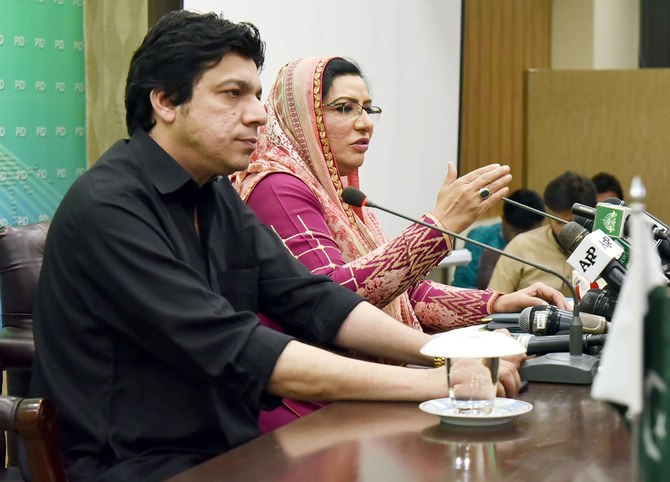ISLAMABAD: The leadership of ethnic Pashtun Tahaffuz Movement (PTM) has links with international collaborators and financiers to distort image of Pakistan, the government said on Tuesday, announcing a "zero-tolerance policy" for those working against national security.
The announcement comes just a day after Pakistan army spokesman Maj. Gen. Asif Ghafoor warned leaders of the movement of legal action for inflammatory speeches against state institutions, accusing them of having links with Indian and Afghan spy agencies, and questioning their sources of funding.
“The government and army are on the same page [with respect to the PTM], and we have a zero-tolerance policy for traitors of the country,” Special Assistant to Prime Minister on Information and Broadcasting, Firdous Ashiq Awan, said while briefing the media after a federal cabinet meeting.
The PTM was founded in January 2017 to protest alleged extrajudicial killings, arbitrary detentions and disappearance of young ethnic Pashtun men under the guise of operations against the Pakistani Taliban and other militants in the country’s northwestern tribal regions. Leaders of the movement blame Pakistan’s military for these abuses, which the army strongly denies.
Awan warned that those misguiding youth would be dealt with “iron hands,” as national interest and security of the country remained top priority for the government.
“Some elements have penetrated into the PTM who have been working against the national security,” she said, “they have been trying to distort the image of Pakistan through baseless propaganda.”
Endorsing the army’s statement, she said the PTM leadership has links with the international collaborators and financiers who have been “providing space to them”under the garb of sour relations between Pakistan and India.
She signaled the government will initiate legal action against PTM leaders in the coming days, but declined to elaborate the nature of action. The political leadership has engaged the movement’s leaders as not all of their followers are anti-Pakistan, she said.
“The youth of FATA [tribal districts bordering Afghanistan] is our asset who never sided with the terrorists during the military operations,” she added.
The PTM was initially pushing the government and the armed forces to meet their three demands including clearance of mines from the tribal districts, abolition of check posts, and recovery of missing persons. The army spokesman explained on Monday that significant progress has been made on all these demands, but alleged that the PTM was involved in anti-state activities.
Ghafoor also said the army had details of PTM's covert funding received from National Directorate of Security (NDS) in Afghanistan and the Indian Research and Analysis Wing (RAW) along with the trail of PTM leaders’ secret visits to Indian consulates in Afghanistan.
Rahimullah Yusufzai, senior political and security analyst, said the state felt that the PTM has crossed the “red lines” that included inflammatory speeches against the state institutions, and that is why it has announced to initiate legal action against them.
“It seems that PTM will no more be allowed to continue its political activities,” he told Arab News. “The matter will go to the court and if security institutions succeed in proving their charge of foreign funding received by PTM leaders then it will be banned.”


















